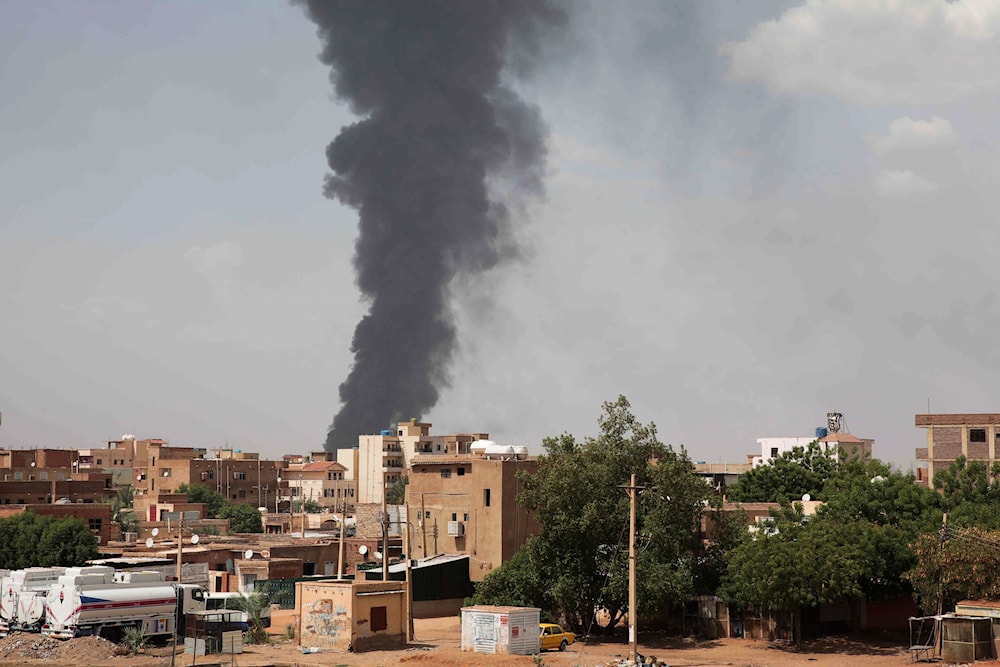Sudan war ravaging millions of lives over a year into conflict
The ongoing war in Sudan has left nearly 10 million displaced within the country and the region.
-

Smoke rises over Khartoum, Sudan, June 8, 2023. (AP)
Sudan is grappling with the world's most severe hunger and displacement crisis over a year into the devastating war resulting from the violence between the Sudanese Armed Forces and the paramilitary Rapid Support Forces (RSF).
The war has led to widespread destruction and death, with at least 16,000 dead and millions more displaced internally and externally amid a devastated healthcare system.
The International Organization for Migration (IOM) reports that over 7.7 million people have been internally displaced since the onset of the conflict. Additionally, more than 2 million people have sought refuge in neighboring countries, with children under the age of 18 making up 55% of these displaced persons.
UNICEF has identified Sudan as having the highest number of displaced children globally, with 5 million affected. The IOM has highlighted that the majority of these displacements come from Khartoum (36%), South Darfur (20%), and North Darfur (14%), the areas most affected by the war.
The UN Office for the Coordination of Humanitarian Affairs (OCHA) has painted a grim picture of the deteriorating situation across Sudan. Women, children, and entire families are being forced to flee, abandoning their homes and possessions, with OCHA also reporting that Sudan is currently facing its worst food insecurity in two decades.
World Health Organization (WHO) Chief Tedros Adhanom Ghebreyesus stressed the severity of the crisis, underlining that one in every five people in Sudan is experiencing emergency-level food insecurity. He highlighted that 755,000 people are facing catastrophic hunger, with 25.6 million dealing with acute food shortages.
Approximately 8.9 million Sudanese children are suffering from acute food insecurity and disease, UNICEF Representative in Sudan Mandeep O'Brien said, while UNICEF Executive Director Catherine Russell described Sudan as "one of the worst places in the world" for children.
Weaponization of famine
Sudan descended into chaos in April last year when tensions between the country's military and the paramilitary Rapid Support Forces (RSF) erupted into open conflict in the capital, Khartoum, and other regions.
United Nations human rights experts cautioned that famine was imminent, as humanitarian aid has been blocked and the harvest season disrupted by the war. They mentioned that more than 25 million civilians in Sudan, along with those who have fled the country, are being starved and urgently need humanitarian aid.
A report by the Clingendael Institute think tank last month estimated that approximately 2.5 million people in Sudan could die from hunger by the end of September, with around 15% of the population in the Darfur and Kordofan regions likely being the hardest hit.
The independent experts emphasized that local efforts to respond to Sudan's hunger crisis have been hindered by unprecedented violence and targeted attacks on civil society and local responders, adding that dozens of activists and local volunteers have been arrested, threatened, and prosecuted in recent weeks.
They indicated that "the deliberate targeting of humanitarian workers and local volunteers has undermined aid operations, putting millions of people at further risk of starvation," noting that "local responders are risking their health and lives and working across battle lines."
The experts also accused Sudan's warring factions of weaponizing starvation against the civilian populations.

 3 Min Read
3 Min Read








